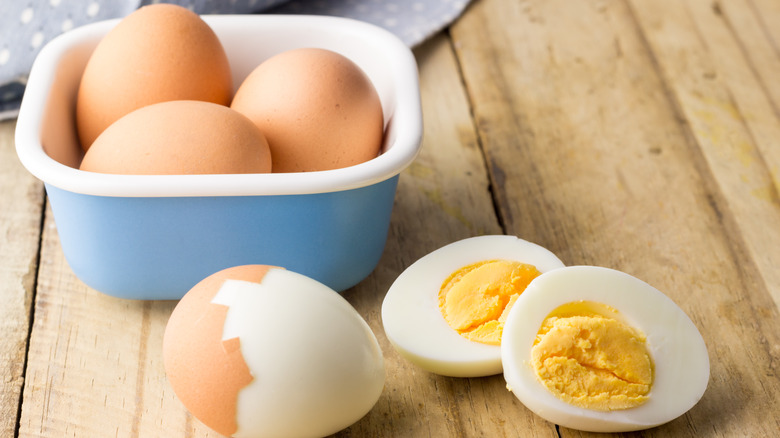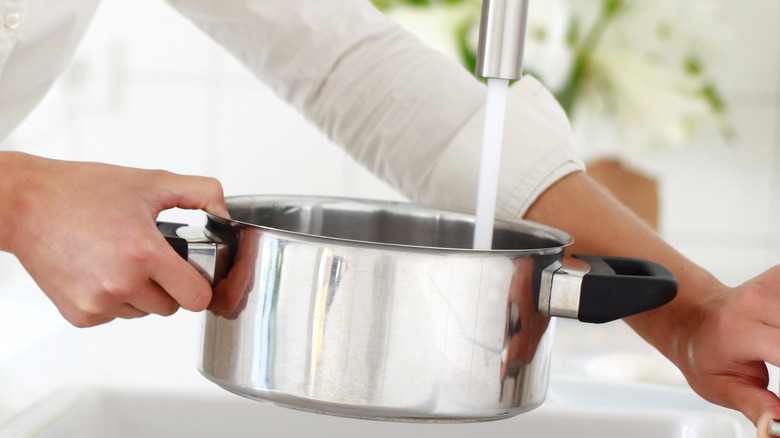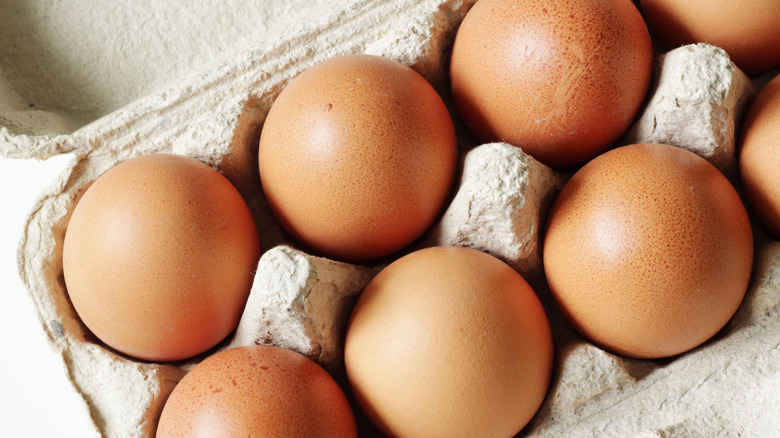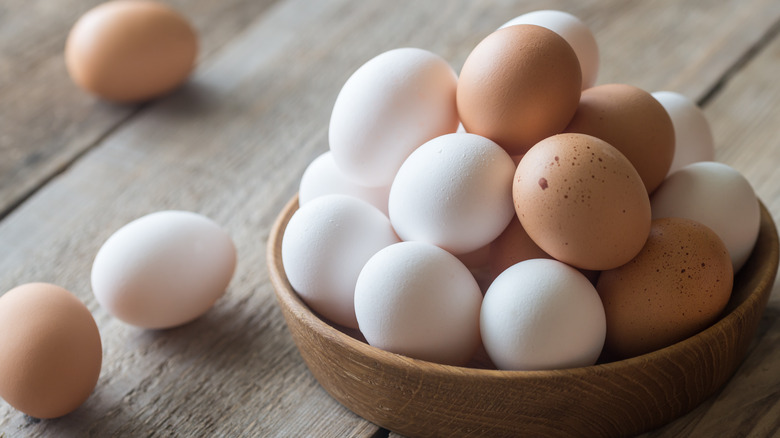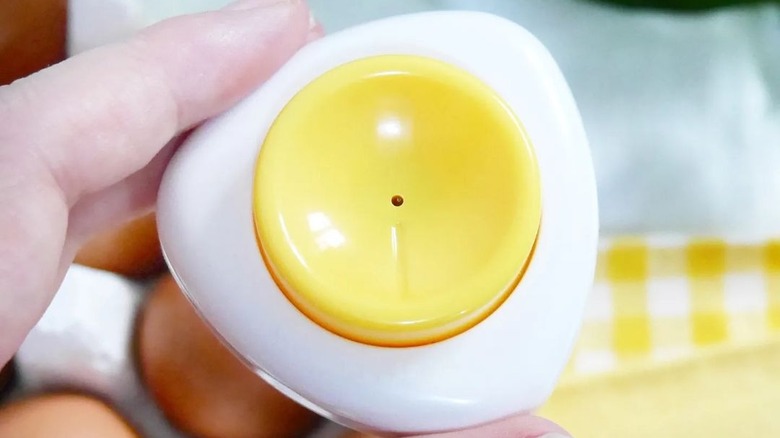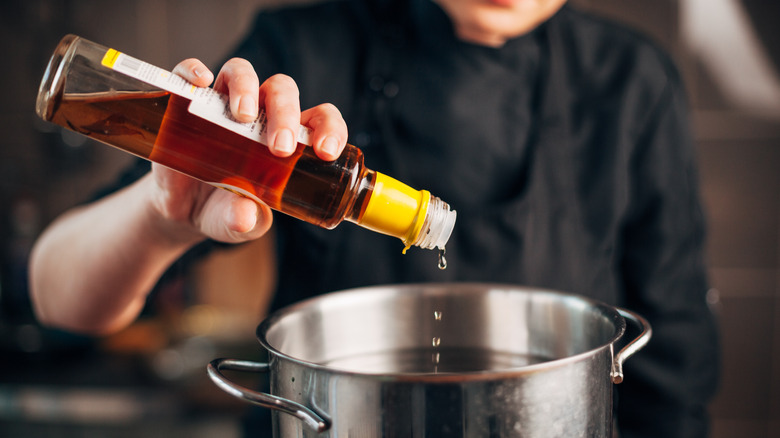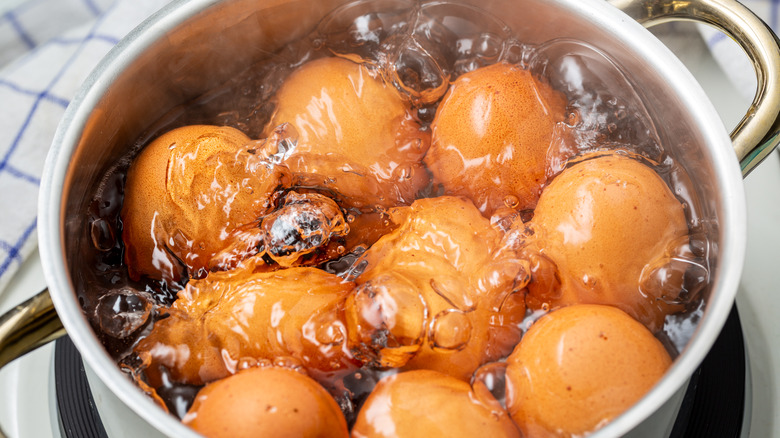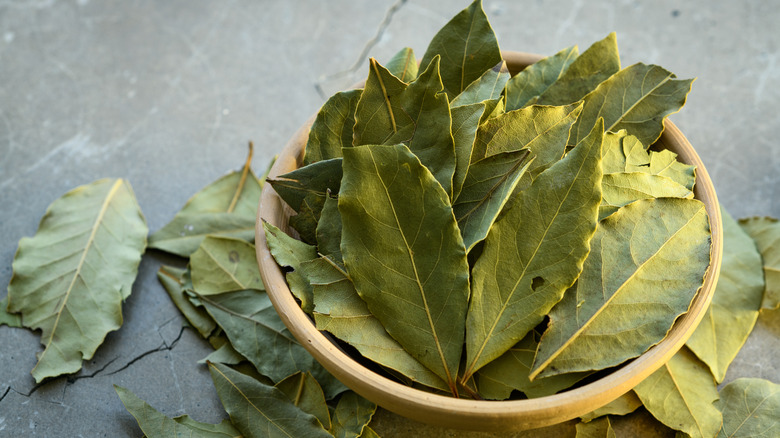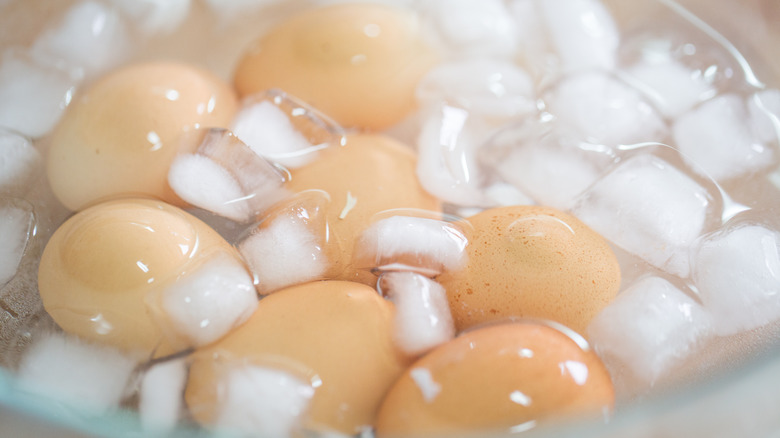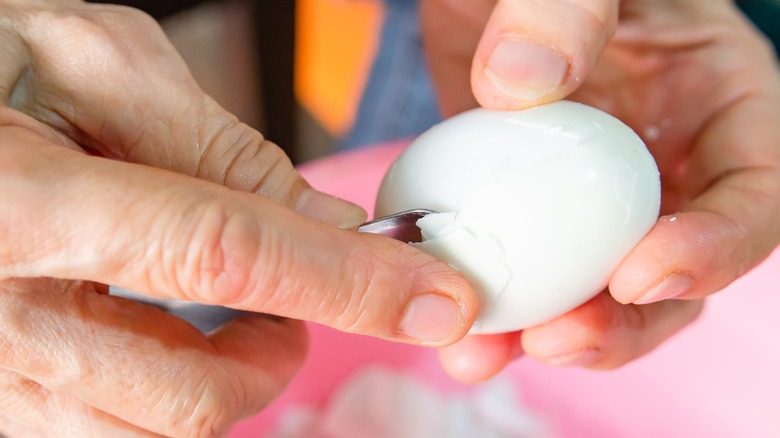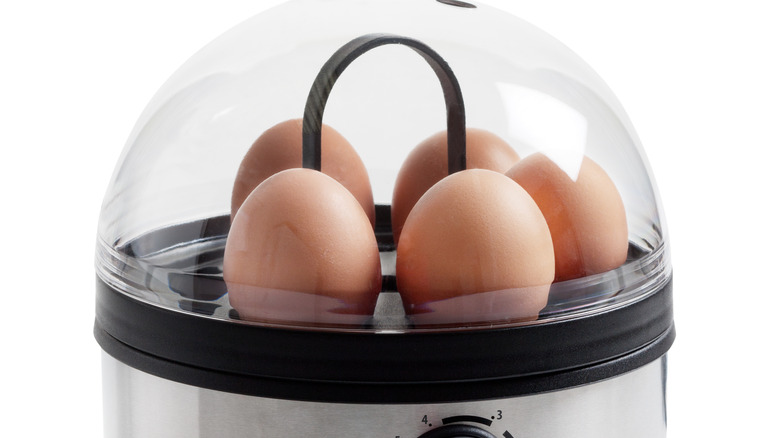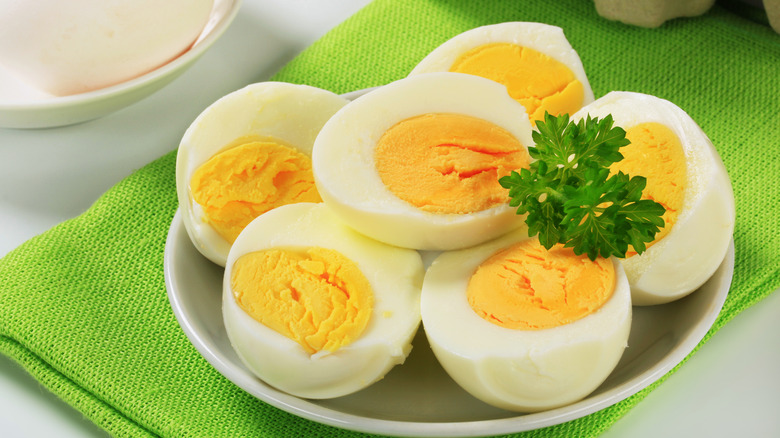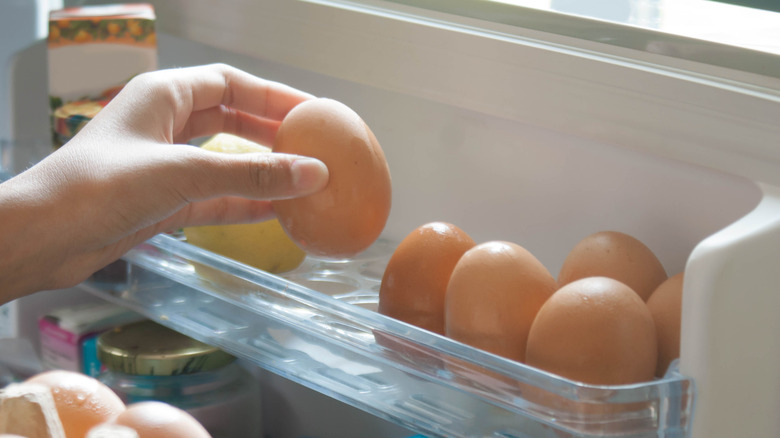Hard Boiled Egg Tricks You'll Wish You Knew Sooner
There's nothing quite like a good hard boiled egg — creamy, savory, packed with protein — as versatile as they are delicious. Serve them for breakfast, grab a couple as a quick mid-day snack, or mash them in a bowl and add mayo, chives, mustard, and lemon juice for a hearty egg salad. You can even use hard boiled eggs as the base for the best party appetizer of all time: the great American deviled egg!
Preparing these beauties couldn't be easier. You just need a pot and water. Let your eggs boil for 10 to 12 minutes, depending on their size, and you've got incredible hard-boiled wonders that you can put to use in so many delectable ways.
But as simple as it is to make hard boiled eggs, there are some essential tricks and hacks for making them even better than they already are. Here's a dozen hard boiled egg tricks you'll wish you knew sooner.
Start your eggs boiling in cool water, not hot
Making better hard boiled eggs starts as soon as you fill the pot with water — before you even put it on the stove. While you might be tempted to let your water run until it's hot, don't. Similarly, avoid letting your water boil before adding eggs.
For hard boiled eggs that peel like a dream, you want to let your water and eggs increase in temperature at the same time. The slower, more gradual rise in temperature as the eggs cook and solidify helps create a gap between the egg white and the egg's inner membrane, which makes peeling easier. So fill the pot with cool water, then add the eggs. Next, turn on your stovetop — when the water starts to boil, start your timer (10 to 12 minutes) so you know precisely when they will be done.
In addition to helping promote more even cooking — and ensuring your eggs end up with a tender, creamy yolk — beginning the process with cool water reduces the risk of eggs cracking as they cook.
Older eggs peel easier than fresh
While it just makes sense to use your older eggs before moving on to a new dozen, this is especially true when it comes to hard boiled eggs. In fact, if you have the choice, always use older eggs for hard boiling, rather than those that are freshly bought. Why? Older eggs simply make better quality hard boiled eggs. As eggs age, the pH level — or the level of alkalinity — within the whites increases, causing those whites to adhere less tightly to the inner membrane of the egg. This makes older hard boiled eggs considerably easier to peel.
In contrast, newer eggs have lower pH levels, resulting in a much tighter bond between the egg white and membrane. If you've ever experienced trying to peel a stubborn egg that wouldn't come unstuck from the shell — and that you ultimately destroyed while peeling — this could have been the issue.
If all that weren't enough, consider this: Eggshells are slightly porous and air can pass through them. As eggs age, water evaporates out of them through their shell. This allows the natural air bubble within every egg to increase in size. And as that air bubble grows, it pushes the yolk further into the center of the egg. Meaning, older eggs are also going to look prettier and more symmetrical when you cut them open, compared to fresher eggs.
Always boil room temperature eggs
Just as the pot of water shouldn't be too hot or cold — aim for a nice even temp — the eggs should be similarly room temperature before hard boiling them. Instead of pulling your eggs from the fridge and immediately cooking them, allow a 15 to 20 minute grace period. Set your eggs on the counter and let them gradually warm up. Cook them when they are no longer cold to the touch.
Room temperature eggs offer several advantages when hard boiling. For one thing, a slower heating process ensures your eggs cook more evenly, reducing the risk for slightly runny or rubbery eggs. They're also significantly less likely to crack open while cooking — going from ice cold to boiling hot is a much more severe change in temperature and is one of the most common reasons for hard boiled eggs to crack. And perhaps most importantly, room temperature eggs also keep the peeling process free of frustration — you can just slip off that peel and move on to better things ... like eating them.
Invest in an egg piercer to make peeling easier
Prepare a lot of hard boiled eggs? If so, it might be time to invest in one of the greatest cooking gadgets available: the egg piercer. Retailing in specialty shops for just a few bucks, an egg piercer is an incredibly simple and effective tool designed for one express purpose — it gently punctures a small hole in the round end of any eggshell.
To understand why that's important, consider this quick science lesson: When eggs heat during the boiling process, the natural air bubble hiding inside expands — most of the time, nothing happens. But if you get a lot of cracked eggs while making hard boiled eggs — and they're room temperature to start — then it's likely this hot air that is to blame. The pressure within the egg gets too intense as all that expanded air builds up, and your egg bursts as a result.
You can avoid this by piercing a small hole in the shell before cooking the eggs. As the pressure within the egg builds, the air now has a place to escape — via that tiny hole. And this means no more cracked eggs once you put them on to boil. Tada!
Add vinegar or baking soda to your water
Pop quiz: Remember how we told you about older eggs being slightly more alkaline (or having a higher pH) and being easier to peel as a result? Well, put on your mad scientist cap because there are other ways to play with your water's pH when making hard boiled eggs. Adding vinegar makes the water more acidic. Or you could shake in some baking soda, which makes it more alkaline. Each technique has its own pluses, and there are people that swear by each.
Adding vinegar to the water for hard boiled eggs has two main benefits: It keeps whites from spreading, should your egg crack. (This is the same reason many people add a touch of vinegar to the water when making poached eggs.) Vinegar also helps to make the egg whites set faster. And it dissolves some of the calcium from your eggs' shells, making them easier to peel. You don't need a lot — try 1/4 cup of white or apple vinegar for half a dozen eggs. (Don't worry — the vinegar won't impact their taste.)
On the flip side, adding 1/2 teaspoon of baking soda to the water increases alkalinity. As the pH rises, this helps to mimic the same benefits that come from cooking older eggs. The bond between the egg white and the egg's inner membrane weakens, and the egg becomes easier to peel as a result.
Simmer, don't boil
Congratulations! Your cool water and room temperature eggs (with a tiny piercing in the bottom of each) are in the pot with a bit of vinegar, and the water has started to boil. You're half way there! Now, instead of letting your water continue to roll away at that bubbly high temperature, put a lid on the pot and lower the temp on your stovetop.
For the best quality hard boiled eggs, you should always let your eggs simmer in hot water as they cook, instead of leaving them in water at a rolling boil. Simmering eggs at a lower, steadier temperature results in great tasting hard boiled eggs. They'll be more tender and evenly cooked than eggs that are boiled exclusively. Simmering also ensures a gentler cooking process, reducing the likelihood of cracks and ensuring that egg whites maintain their delicate texture and consistency. Overall, simmering makes for a more controlled cooking experience.
And perhaps most important: It can significantly reduce the risk of that freaky greenish ring that sometimes forms around the yolks of eggs that have been cooked at higher temperatures. Nobody wants green eggs — unless of course you're cooking exotic looking and naturally green-shelled eggs! Of course, there's the whole "Green Eggs and Ham" thing, but that's another story!
Infuse your eggs with subtle flavor as they cook
Can you add flavor to hard boiled eggs as they cook? It's a debate. Some say yes — since eggshells are permeable and allow air and moisture to enter and leave an egg in small amounts, you can also subtly flavor your hard boiled eggs by adding spices to the water as they cook. Other people insist any flavor from an egg that has been boiled in anything other than pure water is only imagined. Who's right? Who knows. Try flavoring your egg with a bit of spice in the water as it cooks ... so you can determine for yourself.
Throw a couple bay leaves into the water as it's heating and coming to a boil. Add 1 tablespoon of curry or some Old Bay seasoning or any other favorite herb or spice you'd like to try. And don't forget to shake in 1 tablespoon of salt. Even if the jury is out on the effectiveness of herbs and spices adding flavor to hard boiled eggs, salt does seem to add a subtle, gentle brininess to your hard boiled eggs as they cook and set. It also slightly raises the temperature of boiling water, which helps egg whites cook more quickly and reduce the chance of eggs ending up rubbery.
Stop the cooking process with an ice bath
Once your perfectly prepared eggs have cooked for 10 to 12 minutes, it's a good idea to enlist this next egg trick. This is where most mistakes with hard boiled eggs occur — you don't want to let them overcook and ruin all the hard work you've put into making them. So don't simply turn off the burner and let them sit in that hot water where they'll continue to simmer.
Instead, it's time to give them an immediate ice bath. Fill a large bowl with ice and a bit of water and then transfer your hard boiled eggs into this ice bath. This will instantly stop the cooking process and prevent overcooking. An ice bath will also help keep your eggs from having dry and rubbery whites and discolored yolks.
And shocking eggs in an ice bath makes them easier to peel — the quick temperature change causes the egg whites to contract slightly, creating a small gap between the egg white and inner membrane of the egg. This separation makes it easier to peel eggs without damaging their exterior, resulting in smooth and beautiful hard boiled eggs we all want on our plates.
If you don't have a ready supply of ice, cool your eggs in the next best way. Put them in a large colander and run cold tap water over them until they are cool to touch.
Make peeling a breeze
Following that ice bath, you can now peel your eggs — in fact, the colder you get the eggs, the easier that process is. To make peeling hard boiled eggs a breeze, also consider peeling your eggs under running tap water. The water provides a bit of added lubricant, helping the shells to come off more easily. And it will wash away any tiny bits of shell that might have broken off during the peeling process.
For the most efficient peeling, first crack the egg on the counter. Next, gently roll it back and forth under your palm, lightly pressing it into the counter to fully break up the shell. Then, start the actual peeling of the egg from the wide base and not the skinnier top side. The air bubble within the egg is generally in the lower half — so peeling this section first frees up excess tension within the shell and helps the rest of the peel to slip off more easily.
For a shell that is really stuck and just won't seem to break free, consider the "spoon method." Grab a small spoon and use it to help lift the shell away from the egg white instead of just trying to force it away with your fingers, which will only end up destroying the egg.
Shells still sticking? Consider steaming instead of boiling
While boiling is the easiest way to cook eggs in their shells, there are a number of other methods worth trying if you're looking for an alternative. For instance, you can place eggs into a steamer over boiling water and cook them just like you would asparagus or broccoli. This gentle cooking technique takes about the same amount of time — 10 to 12 minutes — and is said to produce the easiest peeling eggs, since steam is a much less aggressive cooking technique.
To cook eggs in about half the time of normal, you could also use an Instant Pot. Add water to the appliance, place the eggs on a trivet, and let them cook in the high pressure environment just like you would on the stove, following with an ice bath once cooking is complete. Or, to cook a large amount of eggs all at once, consider using a slow cooker. Just fill the appliance with as many eggs as you want, add enough water to cover them, and let them cook on low for four to six hours.
Serve boiled eggs with a drizzle of warm olive oil
Even the most perfectly cooked, well-seasoned hard boiled egg can sometimes seem a bit bland and dry. To truly bring out the delicate, natural goodness of that egg, try serving the next one you cook drizzled with a bit of warm olive oil — you don't need a lot. Just a small dab of your favorite EVOO will add a decadent, creaminess to hard boiled eggs that they often don't have on their own.
Simply cut your peeled egg in half, salt and pepper generously, and then add that hint of olive oil goodness. You might also consider a bit of truffle oil or even a favorite sesame oil.
To turn your hard boiled egg plus oil into a meal, chop an entire hard boiled egg, add the oil, mix well, and then serve the egg spread over warm toast. Or sprinkle over a fresh garden salad, on top of your favorite plate of pasta, or in a rich Asan inspired soup like ramen, miso or even pho. You can also sprinkle diced hard boiled egg on top of pizza, baked potatoes, spicy homemade chili or breakfast nachos for an added burst of protein plus some wonderful, unexpected eggy excellence.
Don't peel your eggs until you are ready to eat them
Hard boiled eggs always taste best when served just after being cooked. However, occasionally you have to cook them in bulk because you're super busy — and they are one of the best foods to prepare ahead of time. In that case, cool your eggs in an ice bath or under cold tap water and then store in the fridge within a couple hours to reduce risk of food borne illness.
Keep your refrigerated, hard boiled eggs covered in an air tight container — this will prevent them from picking up odors. Don't peel until you're ready to consume; no longer than a week. Leaving the shells on while refrigerated will keep the eggs from drying out or getting slimy from excess moisture, and it provides a protective barrier that preserves freshness.
Write the date on the shell to help remember when you cooked the eggs — a Sharpie is handy for this. Or draw a big X on one side so you know which eggs in the fridge are hard boiled and which are raw. You can even draw a happy face for your kids so they'll know the eggs are cooked and ready to eat.
What are you waiting for? Get some water boiling — an egg-ceptional treat awaits!

